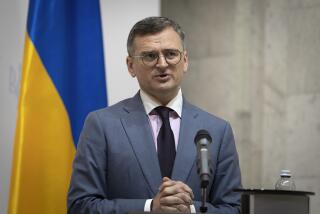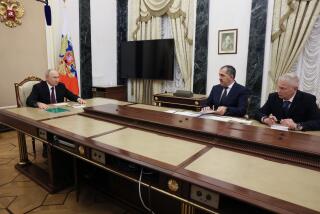Gorbachev Oversees Dumping of Ukraine Chief : Makes a Surprise Trip to Kiev for Replacement of Unpopular Conservative
- Share via
MOSCOW — President Mikhail S. Gorbachev, demonstrating his personal commitment to reviving public faith in the Communist Party, made a surprise trip Thursday to Kiev to oversee the dismissal of the Ukrainian party chief, an unpopular conservative who had controlled the second-largest Soviet republic for 17 years.
Vladimir V. Shcherbitsky, 71, a holdover from the now-discredited era of party leader Leonid I. Brezhnev, was dropped from the ruling Politburo at a meeting in Moscow last week in a move taken as a clear signal that his years in power were nearing an end.
Gorbachev Protege
Shcherbitsky was replaced as party chief in the Ukraine by his deputy, Vladimir A. Ivashko, 57, a Gorbachev protege who was elected by secret ballot.
The Ukrainian party Central Committee accepted Shcherbitsky’s resignation and “expressed gratitude for his many years of fruitful activity,” the news agency Tass said.
Gorbachev’s decision to oversee the dismissal was widely viewed as a sign of his determination to make sure that party officials at top levels have the support of the people.
Recent polls have shown that public confidence in party officials has fallen dramatically, partly as a result of statements by Gorbachev that have focused attention on apathy or even corruption in party organizations.
While seeking to shake conservatives out of the party, Western analysts say, Gorbachev is at the same time mindful of events in Poland, where the Communist Party was unable to shore up the economy or win the support of workers and, as a result, has been forced to give way to the Solidarity trade union movement.
After the party meeting, Gorbachev strolled down a Kiev street and told a crowd he is pleased that the public is demanding improvements from party officials.
“People are pressuring us; that is good,” he said in an encounter shown onn Moscow on the evening television news.
He said bold action is now needed from the party and added: “It is not the moment to play with democracy. The people will not tolerate it.”
Gorbachev returned to Moscow on Thursday night. He made a similar housecleaning visit to Leningrad in July and presided over the removal of party chief Yuri F. Solovyev, a conservative who failed to win a seat in the Congress of People’s Deputies last spring.
Shcherbitsky, as Ukraine party leader, had acquired a reputation in the 1970s for his tough treatment of dissidents. He had become increasingly unpopular--and a growing liability to Gorbachev.
He was widely criticized for dragging his feet on economic reform in the “breadbasket republic” and for maintaining tight control over the news media--in opposition to Gorbachev’s policy of glasnost , or openness.
In addition, the Ukraine has become the site of nationalist and religious unrest that Shcherbitsky has seemed unable to deal with. At the founding convention of a Ukrainian independent popular movement this month, speaker after speaker called for his ouster.
Shcherbitsky entered the Politburo in 1971 and became Ukrainian party chief a year later. In 1987, he was forced to apologize for his failings after a series of accidents a year earlier, including the Chernobyl nuclear disaster.
Last summer, the Ukrainian party leadership was criticized in the Soviet news media for failing to calm miners who had gone on strike. And a number of the republic’s party leaders had been defeated in the spring elections, a sign of low public confidence. Shcherbitsky won a seat in the new Parliament--but he ran unopposed.
The low-key method of dismissing Shcherbitsky was in keeping with Gorbachev’s style, a change from earlier Soviet leaders. Josef Stalin had a number of former leaders executed; in Brezhnev’s time they were often publicly humiliated.
Shcherbitsky’s successor, Ivashko, defeated a Ukrainian party secretary, Stanislav I. Gurenko, for the top party post, Tass said. It said the vote came after “a thorough discussion of the candidates.”
Article in Pravda
Ivashko is viewed as a Gorbachev supporter. Last summer he was assigned to write a front-page article in the party newspaper Pravda supporting Gorbachev’s reforms and calling for action against inept bureaucrats.
Shcherbitsky’s removal had long been expected, but Western observers said he managed to hang on to his job for so long because he had a strong power base in the Ukraine.
Ukrainian activists have speculated that Gorbachev intended to press for Shcherbitsky’s removal during a trip to Kiev in February but postponed the decision after meeting resistance in the republic’s party organization.
More to Read
Sign up for Essential California
The most important California stories and recommendations in your inbox every morning.
You may occasionally receive promotional content from the Los Angeles Times.













